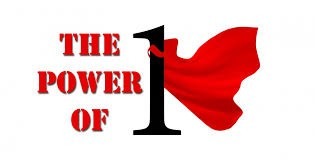Parshas Behar – Bechukosai
The Power of 1!
“If your brother becomes poor and his means fail with you, you must support him….” (Vayikra 25:35)
“I am the L-rd your G-d, who brought you out of the land of Mitżrayim, to give you the land of Cana’an, and to be your G-d.” (Vayikra 25:38)
On Yom Kippur, an elderly resident of Lakewood, New Jersey, davened in Bais Medrash Gavoha, the Lakewood yeshiva. He felt ill and was taken to a dormitory room to lie down. Just before Tefilas Ne’ila, the last tefilla of Yom Kippur, Rabbi Aharon Kotler zt”l, the Rosh HaYeshiva, asked one of his students to go to the dormitory room to daven together with the elderly man. The student said, “But the I won’t be able to daven Ne’ila with a minyan.” Rabbi Kotler replied,”To do chesed for another person is just as important!”
Studying Torah late one night in synagogue, Rabbi Yisroel Salanter zt”l, overheard two poor men talking to each other. One asked the other to accompany him to the well, as he was afraid to go out alone at night. The other was very tired and refused. Immediately, Rabbi Yisroel stopped learning and went to the well to get water for the poor man. (Love Thy Neighbor by Rabbi Zelig Pliskin) [There are times when we should not stop learning Torah to do chesed. Our rabbis can guide us when we should stop learning and when we should not. In this instance, Rabbi Yisroel Salanter stopped learning because he was the only one who could have performed the act of chesed.]
The Talmud (Sotah 14A) says that one should copy the attributes of Hashem and do acts of chesed, acts of kindness. The Talmud brings examples where Hashem clothed the naked, visited the sick, consoled mourners, and buried the dead. Rabbi Simlai said, “Great is chesed for the Torah begins with chesed and ends with chesed. In the beginning of the Torah, Hashem clothed Adam & Chava. In the end of the Torah, Hashem buried Moshe.
Rabbi Moshe Alshich zt”l (as quoted in Iturei Torah by A.Y. Greenberg) points out that in the previous psukim the Torah uses plural terms. However, when the Torah discusses helping a poor person, it changes to the singular. Why? The Alshich explains that it is not uncommon for people to ignore a person in need. People may try to pass the chesed opportunity to someone else who may be a closer friend of the one in need. Or they may try to pass it on to another person who is wealthier and has more money to help. By changing to the singular tense, the Torah is telling us an important lesson. YOU have the obligation to help the poor person in need [if you are able]! Do not try to relieve yourself of the responsibility, by passing it on to another person!
HaRav Henach Leibowitz zt”l explains that the Sforno (Vayikra 25:38) is referring to previous psukim which discuss doing acts of chesed. The Sforno says that when you do an act of chesed, you are doing MORE than an act of chesed for an individual. Rather, it is like you are doing chesed for the entire Jewish People! Your act of chesed is helping to fulfill the purpose of Creation, that of recognizing Hashem.
Rabbi Binyomin Luban (in Chidushei Halev) quotes Harav Henach Leibowitz zt”l with an additional idea from the Sforno. It is impossible for an individual to achieve the purpose of Creation, by himself. It can only be accomplished together with other Jews. Even if the individual is a tzadik or a chasid, he still cannot attain that on his own. It can only be achieved when Jews live together and do acts of chesed for one another. Doing acts of chesed for each other, unifies us as one.
Even a small act of kindness is the fulfillment of the mitzva of chesed. We should be eager to do the chesed and we should run to do it! It is incumbent on us to do so! Every act of chesed that we do for an individual Jew is considered as if we are doing chesed for the entire Jewish nation!
Our act of chesed helps fulfill the purpose of Creation, that of recognizing Hashem!




